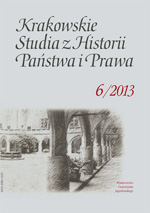Iurisconsultus et Auditores. Dialektyczna formuła poznania i rozwoju prawa w Rzymie republikańskim
Iurisconsultus et Auditores. A dialectic formula of knowing and developing law in republican Rome
Author(s): Paulina Święcicka Subject(s): Law, Constitution, Jurisprudence
Published by: Wydawnictwo Uniwersytetu Jagiellońskiego
Keywords: Roman jurisprudence; education in the Antiquity; legal education in Republican Rome; Roman law; dialectics
Summary/Abstract: The aim of the study is to present the origins of law and the way of teaching of law in Republican Rome, which – as a mode of teaching – started with the moment of laicization of law and jurisprudence itself, and which survived in an almost unchanged form until the end of the Principate era. Therefore, one can speak of a tradition, lasting over several centuries, of direct and oral teaching of law, that resembles a paradigm of teaching in Hellenic and Hellenistic philosophical schools, formed the circles of members faithful to a teaching formula consisting in the primacy of dialectical methods, introduced and elaborated by their founders, such as Parmenides, the sophists, Isocrates, Plato, Aristotle, or Zeno of Elea. This paradigm of teaching in the form of the dialogue – a discussion of the teacher with the student, along with the Greek educational paradigm of paide…a, became a model for organizing the lower and higher education in the entire ancient world. In accordance with the mentioned paradigm of the “knowledge transfer,” in Republican Rome the oral model of transfer of legal knowledge, based on the direct contact of the master and the disciple, was adopted, according to which the master – a legal practitioner, in the form of oral communication (docere), and with the help of precise examples of specific decisions concerning legal problems, taught his disciples, called auditores (hearers), who, afterwards, followed, as qualifying jurists, their master’s paths, taking over and expanding the concepts provided by him, or repeatedly rejecting them and formulating their own ones. Such verbal style of “making science,” such a specific dialectics of a master and a disciple, taking the form of telling legal stories and resolving legal cases, listening and questioning, and operated in the formula of a dialogue or discussion, where the word was the axis of the bearing capacity of legal knowledge and legal culture, transformed in subsequent periods into scientific discussion, extremely important for the development of any science. In this way, one can speak of the continuity of certain scientific concepts and methodological relationships between successive representatives of Roman jurisprudence. These representatives began even to form specific law “schools” (scholae/sectae), consisting of, just as Hellenistic philosophical schools did, the master and auditores, which during the late Republic was reflected by the scientific discussion between two greatest jurists of the epoch, Quintus Mucius Scaevola pontifex and Servius Sulpicius Rufus, and then between their students – scholars called auditores Mucii and auditores Servii, and which had its final in the next epoch, in the formation of two scholae – Sabinians and Proculians.
Journal: Krakowskie Studia z Historii Państwa i Prawa
- Issue Year: 6/2013
- Issue No: 3
- Page Range: 193-227
- Page Count: 36
- Language: Polish

